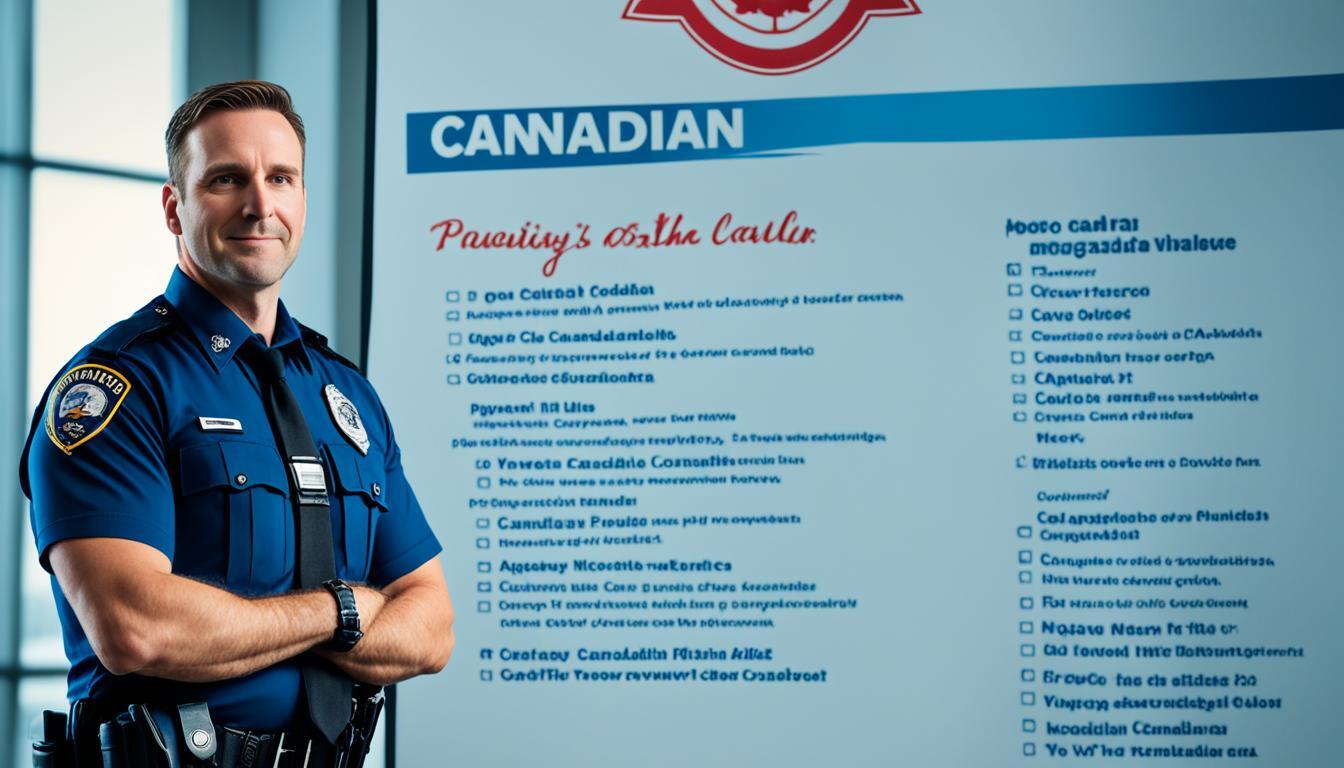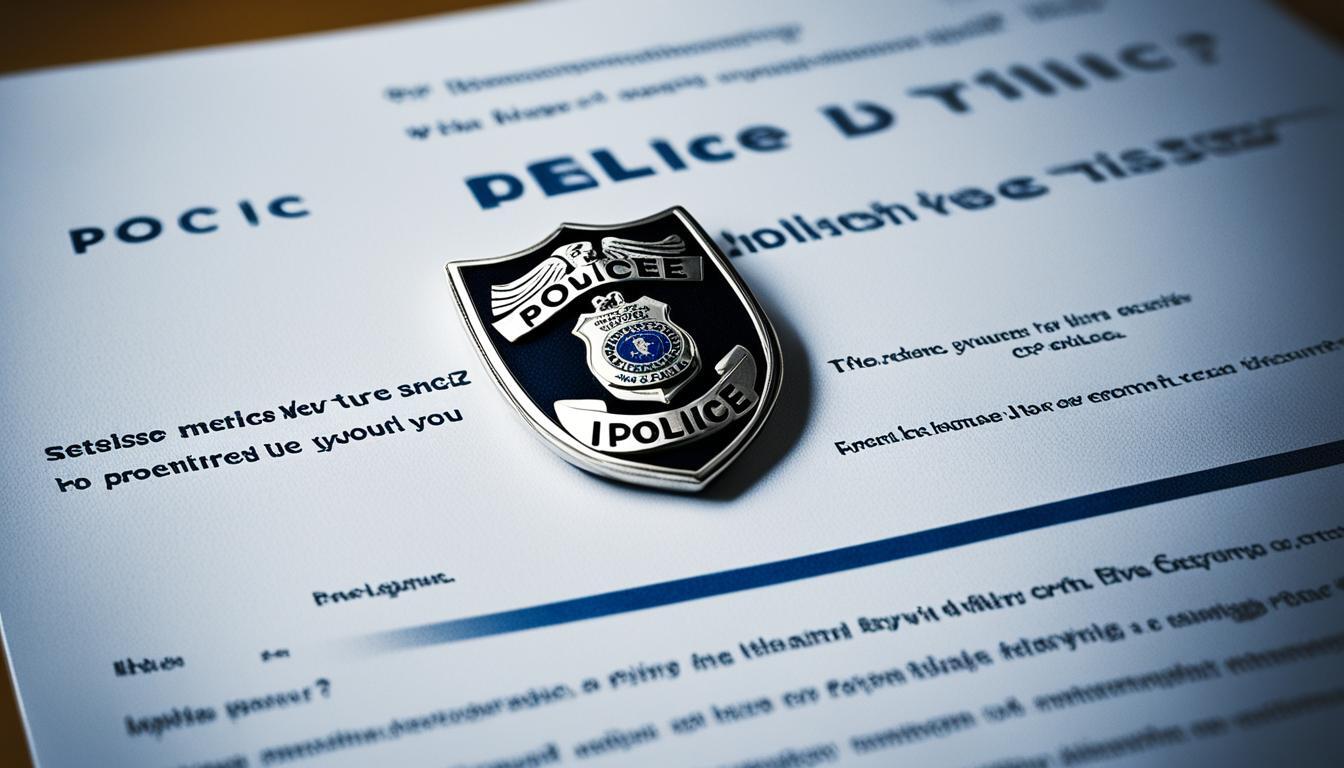Understanding Police Detention Duration Limits
Did you know that if the police have reasonable and probable grounds to detain you, they can hold you for up to 24 hours without charging you? This period can be extended if you are arrested on a holiday or on the weekend. But what exactly are your rights during police detention and how long can they actually hold you?
Key Takeaways:
- Police can detain you for up to 24 hours if they have reasonable and probable grounds.
- This detention period can be extended if you are arrested on a holiday or on the weekend.
- The police must either release you or bring you before a judge within the 24-hour detention period.
- If bail is denied, you may be held in custody until your trial date.
- Police cannot detain you without reasonable and probable grounds or insufficient evidence.
Your Rights in Police Custody
When you are in police custody, it is crucial to understand your rights and what you are entitled to. The legal detention period and laws on police custody in Canada ensure that your rights are protected during this time.
First and foremost, you have the right to not be arbitrarily detained. This means that the police must have objectively reasonable and probable grounds to detain you for investigative purposes or if they believe you have committed a crime. This ensures that your detention is not based on arbitrary or unfounded reasons.
You also have the right to be promptly informed of the reasons for your arrest or detention. This ensures that you have a clear understanding of why you are being held in custody and allows you to prepare accordingly.
Furthermore, you have the right to consult with and retain a lawyer without delay. Access to legal representation is essential in protecting your interests and ensuring that your rights are upheld. An experienced lawyer can provide you with the necessary guidance and support during this time.
The validity of your detention can be assessed by the court. If it is determined to be unlawful, you should be released from custody. This provides a safeguard against unjustified or prolonged detention.
It is important to note that under Canadian law, you are presumed innocent until proven guilty. This means that while you are in police custody, you should not be subject to any cruel and unusual treatment or punishment. Your rights to fair treatment and dignity are protected.

Understanding your rights in police custody empowers you to advocate for yourself and ensures that your rights are respected. If you believe that your rights have been violated or that you have been unlawfully detained for a period exceeding the legal detention period, it is crucial to consult with a lawyer immediately to protect your interests and seek appropriate legal remedies.
Duration Limits of Police Detention
The duration of police detention can vary depending on the circumstances. If you are detained without charges, the police can only hold you for a reasonable period of time. However, what is considered reasonable can be subjective and may depend on factors such as the nature of the offence, the complexity of the investigation, and any immediate safety concerns.
It is generally expected that police detainments should be brief, and a significant delay between detainment and arrest can be challenged as a violation of your Charter Rights. If you are arrested, you have the right to a bail hearing within 24 hours or as soon as possible, where a judge will determine whether you should be released or held in custody until your trial date.

Factors Affecting Detention Duration
When considering the duration of police detention, several factors come into play:
- The nature of the offence: The severity and complexity of the alleged crime can impact the time required for thorough investigation.
- Investigation complexity: If an investigation involves multiple suspects, witnesses, or a substantial amount of evidence, it may take longer to gather information and build a case.
- Immediate safety concerns: If there are immediate safety concerns related to the detainee or the public, the police may need to keep the individual in custody to mitigate any potential risks.
While these factors are considered, it is important to emphasize that the duration of police detention should be reasonable and not unjustifiably prolonged. Canadians have the right to be free from arbitrary detention without charges, and any violation of this right can be subjected to legal scrutiny.
Charter Rights and Bail Hearing
Under the Canadian Charter of Rights and Freedoms, individuals have the right to not be unlawfully detained and to be promptly informed of the reasons for their arrest or detention. This includes the right to consult with a lawyer without delay. If you believe your detention is unreasonable or your Charter Rights have been violated, it is crucial to seek legal representation.
When arrested, you have the right to a bail hearing within 24 hours or as soon as possible. At the bail hearing, a judge will review the circumstances and evidence presented to determine whether you should be released or held in custody until your trial date.
Protecting Your Rights
If you find yourself in police detention without charges or facing potential pre-trial incarceration, it is essential to understand and assert your rights. Consulting with an experienced criminal defence lawyer can help safeguard your rights and ensure the best possible outcome.
Protections Against Unreasonable Detention
The Canadian Charter of Rights and Freedoms provides essential protections to individuals who are detained or arrested by the police. It ensures that your rights are safeguarded and sets limits on police detention. Let’s explore the specific rights you have in police custody:
- The right to be promptly informed of the reasons for your arrest or detention
- The right to consult with a lawyer without delay
- The right to have the validity of police detention assessed by the court
- The right to not be subject to any cruel and unusual treatment or punishment
These rights are outlined in Section 7-14 of the Canadian Charter of Rights and Freedoms, ensuring that you are protected against unreasonable detention. If you believe that your Charter Rights have been violated during an arrest or temporary detainment, it is crucial to consult with an experienced criminal defense lawyer. They will work tirelessly to defend your rights and ensure that you receive fair treatment under the law.
| Charter Rights | Explanation |
|---|---|
| The right to be promptly informed of the reasons for your arrest or detention | This ensures that you are aware of why you are being detained and allows you to understand the legal basis for your arrest. |
| The right to consult with a lawyer without delay | This fundamental right allows you to seek legal advice and have proper representation throughout the process. It ensures that you have a fair chance to defend yourself. |
| The right to have the validity of police detention assessed by the court | This right ensures that the court reviews the lawfulness of your detention and protects you from arbitrary or unjustifiable detainment. |
| The right to not be subject to any cruel and unusual treatment or punishment | This protects you from any form of mistreatment or punishment that is excessive, inhumane, or degrading. It upholds your dignity and ensures you are treated with respect. |
Your Rights to Bail
If you find yourself facing potential pre-trial incarceration, it is crucial to be aware of your rights to bail. In Canada, you have the right to a bail hearing before a judge within 24 hours or as soon as possible after your arrest. This hearing will determine whether you should be released or held in custody until your trial date.
Having a skilled bail hearing lawyer by your side can make a significant difference in the outcome of your case. Your lawyer will help present compelling arguments for your release and may also challenge the duration of your detention or any violations of your Charter Rights.
It is important to remember that you have the right to not be denied reasonable bail without just cause. A skilled lawyer will advocate for your rights during the bail process, ensuring that your best interests are protected.
- Canada Arrest Protocol: What Police Say Upon Arrest - June 12, 2025
- Can Police Disclose Who Reported You? Find Out Here - June 6, 2025
- 2025 Window Rebates Ontario: How to Save Money While Replacing Windows and Doors - April 24, 2025




















Post Comment